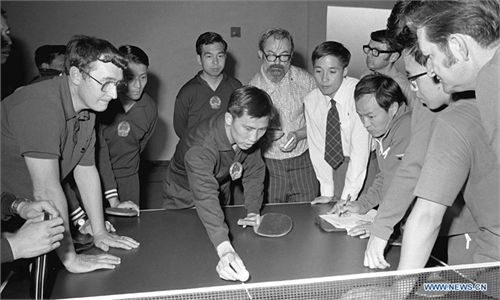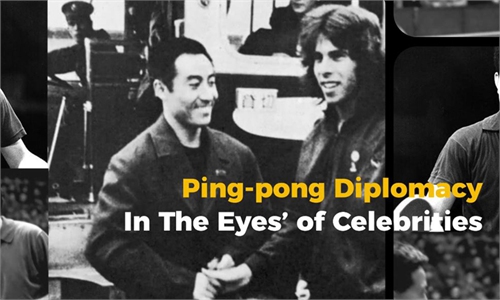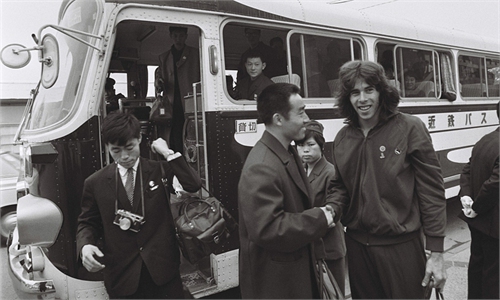'Friendship first': witness Xu Yinsheng reviews the milestone China-US ping-pong diplomacy
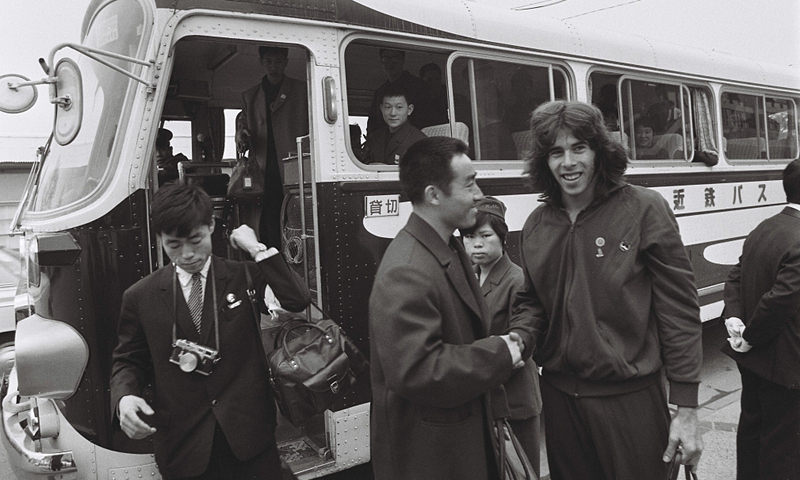
American player Glenn Cowan (right) shakes hands with Chinese player Zhuang Zedong(center) after getting off a bus for Chinese players during the 31st World Table Tennis Championships on April 4, 1971 in Nagoya, Japan. Glenn Cowan, who missed a bus for his own team, accidentally boarded a bus for Chinese players, which led to a domino of events that saw the normalization the China-US relationship. File photo: VCG
On China's invitation, the US table tennis delegation visited China in April 1971 under a global spotlight, after the two countries had no official contact at all for more than two decades. The Chinese table tennis players paid a return visit to the US the following year.The ice-breaking visits, later becoming known as ping-pong diplomacy, paved a way for the normalization of the China-US relations in those hard years filled with ideological confrontations.
Fifty years on, ping-pong diplomacy "still provides a valuable reference for the two countries in dealing with the fluctuations in their relations," said Xu Yinsheng, honorary president of the International Table Tennis Federation (ITTF) who witnessed ping-pong diplomacy in the early 1970s as then coach of Chinese table tennis national team.
"People of the two countries should cherish this hard-won achievement," 83-year-old Xu told the Global Times on Tuesday.
Xu coached the national team in the Nagoya 1971 World Championship in Japan, prior to which Chinese table tennis players had missed world-class competitions for four years because of the Cultural Revolution (1966-76), "let alone talking to American athletes," Xu said.
Therefore, when US player Glenn Cowan mistakenly boarded a shuttle bus carrying the Chinese team during the match, the Chinese players were a bit surprised at the presence of this Hippie-haired young American. "But we had no hostility toward him," said Xu, who was also on the bus.
Instead of "kicking the American off the bus" as some people guessed occurred, the Chinese players showed Cowan their friendship and goodwill. Xu recalled that player Zhuang Zedong even tried to talk to Cowan with gestures, and then sent him a brocade scarf as a present.
The unexpected talk Zhang and Cowan between Chinese and American athletes soon attracted global attention, and prompted the Chinese authority to finally make up its mind to invite the US team to visit China after the match, which opened a window to the people-to-people exchanges after years of China-US relationship suspension, Xu said.
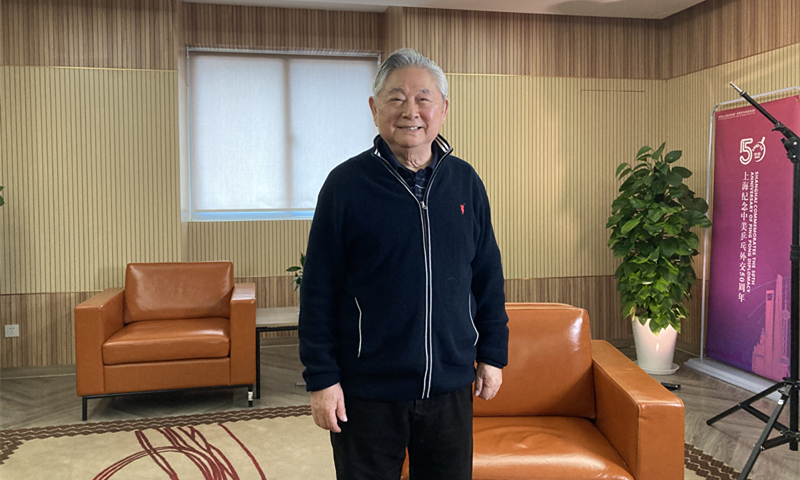
Xu Yinsheng at the International Table Tennis Federation Museum in Shanghai on April 27, 2021. (photo: Huang Lanlan/GT)
The bus talk and the following visits, though taking place by chance, was a result of the wisdom and foresight of then Chinese and US leaders, who had been considering to change the status quo and ease the tensions between the two countries, Xu noted."Premiere Zhou Enlai told us 'friendship first, competition second' before we went to Nagoya," Xu told the Global Times. The saying was quite new to Xu and other table tennis players, as Chinese athletes were usually told to put "fighting for gold medals" and "winning honor for the country" the upmost, Xu said.
"But Premiere Zhou taught us that, we played ping-pong not only fight to be champions, but also make effort towards peace and friendly exchange between nations," he added.
The China-US relations gradually improved with the help of ping-pong diplomacy. Months after the US table tennis team traveled to China, then US president Richard Nixon began his official visit to China in February 1972, and the two countries finally issued the Joint Communiqué in Shanghai, getting to China-US relations back on track.
Looking back the ping-pong diplomacy, Xu, busy with participating in commemorations for the 50th anniversary of the ping-pong diplomacy across China this month, told the Global Times that he was proud of being a witness of this historic event.
Ping-pong diplomacy, which once broke the ice between the two countries in a smart, flexible way half a century ago, is a precious legacy that continues to shed light on the twists and turns in today's China-US relations. "People-to-people exchanges are always important," Xu said. "Like ping-pong, there will always be opportunities and platforms for people of the two countries to stay in touch with each other, jointly promoting the China-US relationship forward," he remarked.

